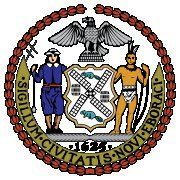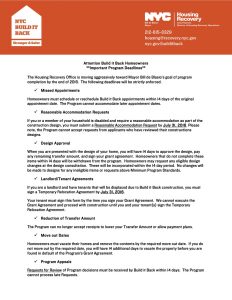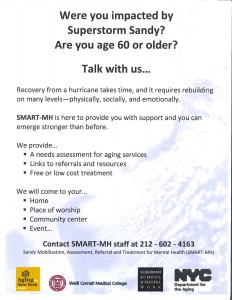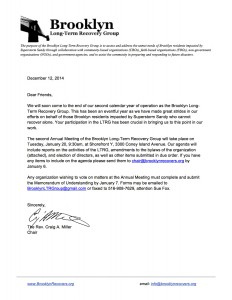Please check out our latest news blast about the snow storm. http://eepurl.com/cBkQbz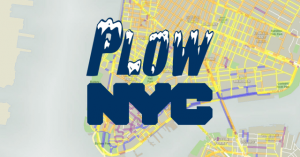
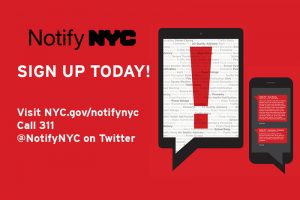
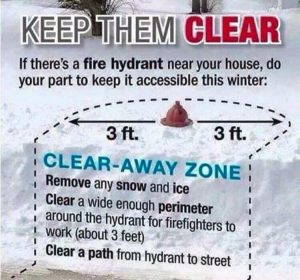
Blog Archives
NYC City Council Committee on Recovery and Resiliency Oversight – Build It Back Program
Please be advised that the Committee on Recovery and Resiliency will hold a hearing on Thursday, September 22, 2016 at 1:00 P.M. in the Committee Room, City Hall, New York, NY regarding the above-referred topic.
If you plan to participate, it would be greatly appreciated if you could bring twenty (20) copies double-sided of your written testimony to the hearing. The Council is extending an special invitations to homeowners registered in the program. Your testimony will be limited to three minutes. You can rsvp to hearings@council.nyc.ny.us
Brooklyn Post-Sandy Mental Health Resources
The BLTRG Mental Health and Spiritual Care Committee has compiled this list of resources for Brooklyn residents. If you have additional resources to add please email chair@brooklynrecovers.org.
Annual Meeting, January 20, 2015 Bulletin of Reports
We are pleased to present the Bulletin of Reports for our Annual Meeting held on January 20, 2015.
Smart MH – Mental Health Services for Sandy affected people 60 and over
Do you know someone, 60+, who is still suffering from Sandy? Call (212) 602-4163. They will come and provide free or low cost treatment and referrals.
Letter to Membership regarding Annual Meeting 1/20
|
|
FEMA Recoupment Letter – Guidance for DCMs
While guidelines for guiding response to FEMA Recoupment letters exist on their website, the Sandy Recovery Office has also provided specific directions for DCMs. You can find them at this Dropbox location.
Client must:
- Respond to the Notice of Debt in a timely manner.
Client may:
- Request the FEMA records pertaining to the recoupment if they are in doubt.
- Appeal the recoupment if they think it is unwarranted.
- Request a payment plan, a hardship waiver, or other modification.
Of the NY cases appealed through the end of October, in 33.5% the recoupment was terminated and in another 5.9% were modified.
If DCMs have questions about the process, they can call the Recoupment Helpline at at 1-800-816-1122 or (TTY at 800-462-7585).
Volunteer Groups Help Brooklyn Families Rebuild, One House at a Time
Groups Repair Sandy Damaged Houses & Get Local Residents Home
Nearly two years after Sandy struck New York City many families are still waiting to recover, but some have gotten back into their houses with the help of volunteer groups repairing homes in Brooklyn. These groups organize local and out of state volunteers and supplies to repair homes with moderate needs to get the house finished and families back home.
On 86th St in Canarsie, volunteer rebuilding groups helped one homeowner save her home. Over the year and a half since Sandy hit, she had been struggling with her mortgage because she, like many homeowners in the flood zone, depended on the rental income to get by. She had paid a contractor to repair the space but due to shoddy work, the rental was still not usable. The case was presented on June 26 and the client’s window of completion was limited – the space had to be rentable by mid-August. UMCOR had finished all of the work by July 26.
“If teams of volunteers can come in and provide free labor to complete non-structural home repairs, then it stretches what money home and business owners have or are going to get to be able to pay skilled labor to take care of those tasks volunteers are not able to perform,” said Pastor Brian Steadman, Director of Resurrection Brooklyn Relief.
“As resources begin to dwindle as we approach the two year anniversary, collaboration among rebuild groups is key to making sure the hundreds, if not thousands, of our neighbors still struggling to recover post-Sandy get the help they need.”
Many of these rebuild organizations started working on homes in Brooklyn immediately after Sandy doing removing debris, treating mold, and helping with demolition and emergency repairs. So far this year volunteer rebuild groups that are part of the Brooklyn Long Term Recovery Group (LTRG) have completed eight repair projects with another eight in progress.
“As many National VOAD groups wrap up their efforts in NYC and move on to other places in the country, the rebuild groups still on the ground in Brooklyn need volunteers now more than ever. Volunteers both locally and nationally must understand we still have a long way to go to recover in Brooklyn. We need teams to come and work with us in Brooklyn, if just for a day but ideally for a week at a time.”
Within the Brooklyn Long Term Recovery Group the Construction, Volunteers, and Donations Committee, an assembly of volunteer rebuild groups in Brooklyn, meets regularly to hear cases from Disaster Case Managers representing families who need help rebuilding. Together, they assess the cases and determine who can take which rebuild project. These groups include Resurrection Brooklyn Relief, New York Annual Conference, Stephen Siller Tunnel To Towers Foundation, Red Hook Volunteers, Habitat for Humanity.
Brooklyn families have been able to get rebuild assistance from volunteer organizations by working with their Disaster Case Manager to access the program. Families in need to rebuild help or other kinds of assistance should contact their Disaster Case Manager, or be connected to a Disaster Case Manager by calling the intake line at 855-258-0483.
More information about Brooklyn recovery and the Brooklyn Long Term Recovery Group can be found online at BrooklynRecovers.org on twitter at @BrooklynLTRGrp or on Facebook at facebook.com/BrooklynLongTermRecoveryGroup
The Brooklyn Long-Term Recovery Group (LTRG) is helping build community-based recovery as a forum for communication, collaboration, and advocacy for community-based organizations, service providers, and disaster relief groups serving Hurricane Sandy impacted families in Brooklyn’s coastal communities.
Brooklyn Residents Find Recovery Help with Disaster Case Managers
Community-Based Disaster Case Management Agencies Help Sandy Impacted Residents Navigate Complex Recovery Programs
With the second anniversary of Sandy approaching, it is important for struggling families to know: you are not alone and you have people who can help.
Disaster Case Managers based at local organizations have been helping impacted residents to navigate the complex and changing recovery programs that exist in New York City in the aftermath of Superstorm Sandy. Each Disaster Case Manager works with up to 34 families as one point of coordinated contact to help them access legal and housing counseling, government programs like Build it Back, and charitable recovery services, some of which are only accessible through Disaster Case Management, like the unmet needs funds or repair assistance through volunteer rebuild groups.
For example, a single mother of one who lived in a basement apartment flooded by Hurricane Sandy, lost almost all of her personal property and was unable to return. A Disaster Case Manager worked with her to secure long-term, affordable, and permanent housing through NYCHA, assisted the client with budgeting, and helped the client search for and secure stable long-term employment. The DCM also applied to the Unmet Needs Roundtable for assistance and was able to help the client receive some replacement furniture and small appliances for the apartment. “Words alone cannot express how this agency has helped myself and my family. You would have to read my utterly grateful heart. Thank you so very much for all of your support,” said the impacted client.
“After local public forums hosted by the Build it Back program, Comptroller Scott Stringer, and others we approach those residents who speak about having difficulties with many of the recovery programs and ask: ‘Do you have a Disaster Case Manager?’ Many didn’t and still don’t realize that this kind of help and support is available to them at no cost,” says Sue Fox, Executive Director of the Shorefront YM-YWHA in Brighton Beach, which has a team of Disaster Case Managers working with local residents.
As of September, Disaster Case Management organizations across the city have 3,531 active cases and have closed over 2,000 by helping families get on the road to recovery. Through the Unmet Needs Roundtable, Disaster Case Managers have been able to access almost $2 million in funding for 708 impacted residents in Brooklyn, and help eight families get their homes repaired through volunteer rebuild groups, with many more in the queue.
Disaster Case Management (DCM) is supported as part of federal disaster assistance following emergencies and helps residents understand and utilize many services and programs that help get people back on their feet. Many community-based organizations in Brooklyn are involved in Disaster Case Management through the New York State program with Catholic Charities or through a variety of donor funded programs. These agencies have the capacity to work with families with many different backgrounds and languages.
“A good Disaster Case Manager is the magic bullet. DCM is how someone affected by Sandy is best connected to the assistance available,” said Richard Vernon, Brooklyn Disaster Recovery Specialist for NYAC/UMCOR. “ A good DCM navigates their client’s household through all the deadlines, financial information, eligibility retirement, language barriers, and so on, to make sure that household reaches the road to recovery.”
Through the DCM committee of the Brooklyn Long Term Recovery Group, DCM agencies are coordinating across agencies, sharing best practices, distributing information about new programs, and plugging into recovery resources for the impacted families we work with. Case managers prepare and present high needs cases to the Construction, Volunteers, and Donations committee, which brings together organizations doing volunteer rebuild and repair work, as well as to the Unmet Needs Roundtable, convened by New York Disaster Interfaith Services, which provides resources to help families become whole and sustainable. Some of these groups involved in the committee include Arab-American Family Support Center, Catholic Charities Brooklyn & Queens (CCBQ), CAMBA, Lutheran Social Services, Met Council, Catholic Charities-Archdiocese of New York, Red Hook Volunteers, and NYAC-UMCOR.
Impacted families who do not have a case manager should call the referral line at 855-258-0483 to be connected to a case manager.
More information about Brooklyn recovery and the Brooklyn Long Term Recovery Group can be found online at brooklynrecovers.org , on twitter at @BrooklynLTRGrp, or on Facebook at facebook.com/BrooklynLongTermRecoveryGroup
The Brooklyn Long-Term Recovery Group (LTRG) is helping build community-based recovery as a forum for communication, collaboration, and advocacy for community-based organizations, service providers, and disaster relief groups serving Hurricane Sandy impacted families in Brooklyn’s coastal communities.

